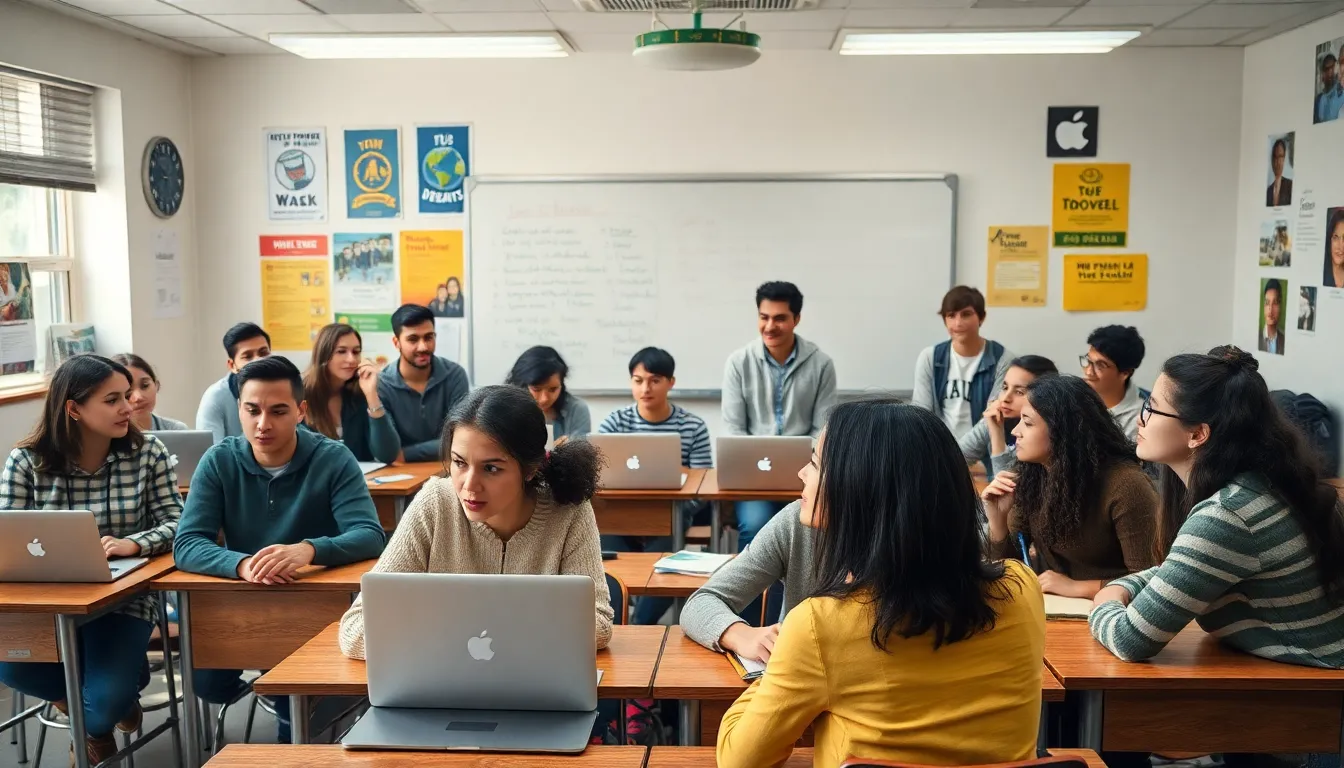Table of Contents
ToggleIn a world where everyone’s got an opinion, finding the right debate topic can feel like searching for a needle in a haystack—except the haystack is also on fire. Whether you’re a seasoned debater or just looking to spice up a dinner party, the right topic can ignite lively discussions and maybe even a few friendly arguments.
Overview of Debate Topics
Debate topics serve as the foundation for engaging conversations. Selecting the right topic can create lively discussions and promote critical thinking. Various categories exist, including social issues, politics, education, and technology.
Social issues encompass debates on topics like climate change and healthcare reform. Political debates often involve discussions on gun control and immigration policies. Education-related topics may include standardized testing and school funding. Technology debates focus on matters like internet privacy and artificial intelligence’s impact.
Debate topics can cater to different audiences. For students, age-appropriate subjects spark interest and enhance skills. For professionals, relevant issues challenge preconceived notions and stimulate intellectual growth.
The importance of current events in debate topics cannot be overlooked. Engaging with trending issues allows participants to connect with real-world situations. Staying informed about national and global news provides valuable context for discussions.
Furthermore, the level of complexity in debate topics varies. Some subjects invite more accessible conversations, while others require in-depth research and critical analysis. Challenges arise when balancing complexity and engagement; however, well-chosen topics navigate this seamlessly.
Finding the ideal debate topic lies in understanding the audience. Considering their interests and knowledge levels ensures meaningful participation. By tailoring topics accordingly, debaters foster collaboration and insightful exchanges.
In sum, various debate topics exist across numerous categories, spanning social issues, politics, education, and technology. Their relevance and accessibility can lead to dynamic discussions, enhancing the overall debate experience.
Popular Debate Topics for Students

Selecting engaging debate topics stimulates critical thinking and enhances discussions. Students can explore various themes relevant to their interests and social landscapes.
Academic Debate Topics
Academic debate topics challenge students to think critically about educational practices. Topics like standardized testing, online education versus traditional classrooms, and the impact of technology on learning encourage in-depth analysis. Each of these subjects opens avenues for discussing equity in education and the importance of accessible resources. Engaging with these topics helps students articulate their perspectives clearly.
Social Debate Topics
Social debate topics reflect contemporary issues and cultural practices. Discussions around immigration policies, the influence of social media on society, and the ethics of genetic engineering drive conversations on responsibility and societal values. Such topics enable students to evaluate differing viewpoints and understand the complexities of societal norms. Fostering awareness of these issues empowers students to participate meaningfully in societal discussions.
Environmental Debate Topics
Environmental debate topics address pressing challenges facing the planet. Issues like climate change, renewable energy sources, and conservation strategies warrant serious consideration. Students benefit from exploring the implications of their choices—ranging from plastic use to carbon footprints. These discussions can inspire actionable change and greater environmental responsibility among students.
Techniques for Choosing Debate Topics
Identifying suitable debate topics requires strategic consideration. Two essential techniques include assessing audience interest and understanding current events.
Assessing Audience Interest
Determining what topics resonate with participants enhances engagement. Begin by gathering input from the audience. Surveys or casual discussions can reveal preferences. Diverse interests help tailor the debate experience. Topics that reflect shared values or concerns encourage participation. Consider educational backgrounds and age demographics. Younger audiences might prefer contemporary issues, while older groups may favor historical contexts. Balancing complexity handles varying levels of understanding. Ultimately, prioritizing audience interest leads to more fervent discussions.
Understanding Current Events
Staying updated with current events ensures relevance in debates. Monitoring news sources, social media, and community discussions reveals trending topics. Recent developments often spark strong opinions. Engaging with these issues fosters real-world connection during debates. News cycles tend to highlight social, political, and environmental matters. Selecting topics that align with ongoing discussions captures participants’ attention. Moreover, exploring nuances within these events can deepen the debate. Participants are more likely to invest in discussions when they relate to timely matters. Prioritizing current events helps keep debates dynamic and engaging.
Enhancing Debate Skills Through Topics
Choosing the right debate topics significantly enhances participants’ skills. Engaging with current events encourages critical thinking and promotes open dialogue. Topics like climate change, gun control, and internet privacy stimulate discussion and challenge debaters to articulate their positions clearly.
Academic debate topics hone analytical skills critical for students. They provoke thought about educational practices and the implications of new teaching methodologies. Addressing social issues fosters awareness of cultural dynamics, allowing participants to engage with real-life scenarios.
Balancing complexity with accessibility is essential. Simple topics can engage novices, while intricate themes can challenge seasoned debaters. Understanding audience knowledge helps create discussions that resonate and motivate participation.
Debate topics shaped by current events maintain relevance. Participants connect with pressing issues that influence their lives, fostering passionate exchanges. Regularly updating topics based on trending discussions keeps debates fresh and engaging.
Input from the audience is valuable when selecting debate topics. Gathering suggestions allows facilitators to tailor discussions to align with participants’ values and interests. Involving the audience promotes investment in the subject matter, leading to more dynamic debates.
Encouraging diverse perspectives enriches debate experiences. Promoting inclusivity allows participants to examine different viewpoints, enhancing their overall understanding. Each debate not only helps refine argumentation skills but also builds confidence in public speaking.
Integrating varying categories of topics ensures comprehensive skill enhancement. Addressing environmental, political, and social themes offers opportunities to explore interconnected issues. A holistic approach broadens knowledge and fosters a more informed and engaged participant base.
Selecting the right debate topic is essential for fostering engaging discussions and promoting critical thinking. By understanding the audience’s interests and current events, debaters can create an environment that encourages meaningful exchanges. The balance between complexity and accessibility ensures that everyone can participate, whether they’re novices or experienced speakers.
Regularly updating topics based on trending issues not only keeps debates fresh but also invites diverse perspectives. This holistic approach enriches the debate experience and helps participants refine their argumentation skills. Ultimately, a well-chosen debate topic can inspire confidence and deepen understanding, making it a valuable tool in any discussion setting.




